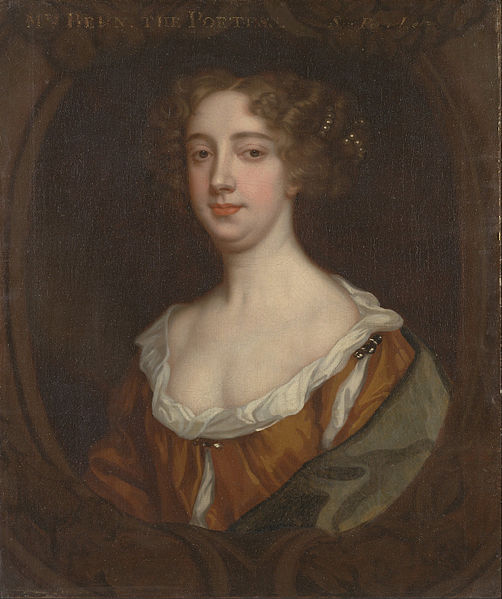
Behn, Aphra
Credited as being one of the first English women to support herself with writing, and the creator of one of the first novels in English, not much is known about Aphra Behn’s early life. This is generally accepted to have been a deliberate act on Behn’s part. Records suggest she was baptised in 1640 and travelled to Suriname in 1663 with the Johnson family, who might have been her benefactors or family, and returned in 1644. Supposedly, she married a Dutch merchant, surname ‘Behn’, in the same year, though her name has never been found on any church or tax records. Growing up in the seventeenth century, Behn was unlikely to have received a formal education and instead was likely to have pursued self-tuition, learning what would become her craft from the poems and writings of others.Upon her return to England in 1664, facts about her life become clearer. By 1666 she was employed as a spy by Charles II – though it has been theorised that she was already working as a spy during her time in Suriname. She worked in Antwerp, Belgium (then a part of the Netherlands), and went by the names of Agent 106 or Astrea. Her job was to look for a soldier named William Scott and convince him to spy for Charles II. Find out more here. Behn was a monarchist and a supporter of the Stuarts, even after Charles II refused to provide her with the funds to return to England. Instead, she had to take out a loan. Unable to pay it back, she was eventually placed in a debtors’ prison in 1668.
This was the start of the rest of Behn’s life. To save herself from prison, she began to write prolifically. She had already been writing poetry, but now she wrote prose and plays as well. One of her best-known works, Oroonoko; or, the Royal Slave, is considered to be one of the first novels written in English. She often adapted earlier works and also worked as a translator, translating works by Ovid and Fontenelle, among others.
Her plays were primarily comedies or tragicomedies, and her use of bawdy concepts won her popularity with the masses but also brought criticism, as it was seen as immoral for a woman to be writing such things. This, coupled with her relative freedom as a woman supporting herself through her own work, made her a figure of scandal. On more than one occasion Behn spoke out (or wrote) about this, pointing out that if her plays were written by a man, he wouldn’t be criticised in the same way. However, Behn’s work was undeniably popular and she made many friends with her charming and generous personality. For her poetry, she was described as a successor of Sappho, not only due to the quality of her writing but for its homoeroticism and focus on love between women, and she went by the nom de plume ‘The Incomparable Astrea’ – a reference to her spy code name.
In her writing, Behn often drew on real-life events. The best-known example of this is Oroonoko; or, the Royal Slave, which follows a Surinamese prince and was likely to have been inspired by Behn’s stay in Suriname. Her poetic style is distinctive, and her plays were criticised as being ‘coarse’ or ‘masculine’ due to their sexual content. In all of her work, Behn pushed boundaries and explored taboo subjects such as women’s sexuality, homoeroticism, or criticisms of religious hypocrisy. Her best-known poem ‘The Disappointment’ (included in her 1684 collection Poems on Several Occasions) has been interpreted as being about impotence and rape, and an in-depth study of her poetry can be found here. Her best-known play, The Rover; or, The Banish’t Cavaliers, follows the amorous exploits of Englishmen and women in Naples during Carnival. Other well-known plays of hers include her first play, The Forc’d Marriage, her only tragedy, Abdelazer, and her final play, The Emperor of the Moon.
Aphra Behn was a mystery, a spy, and a prolific writer. She was one of the most influential dramatists of her time and paved the way for the women, both those who came directly after her, such as Delarivier Manley and Catherine Trotter, and those who followed long after, from Virginia Woolf in 1929 to C J Carey in 2022. Upon her death, Behn was buried at Westminster Abbey, the resting place of honour for poets and authors.
© ZigZag Education 2026: content may be used by students for educational use if this page is referenced.
Show / hide details
| 1640 |
Baptised
|
|
| 1663 |
Travelled to Surinam
|
|
| 1664 |
Got married
|
|
| 1666 |
Employed as a spy by Charles II
|
|
| 1668 |
Placed in a debtor’s prison
|
|
| 1670 |
Produced The Forc’d Marriage
|
|
| 1671 |
Produced The Amorous Prince
|
|
| 1676 |
Produced Abdelazer; or, The Moor’s Revenge
|
|
| 1677 |
Produced The Rover
|
|
| 1684 |
Produced Poems upon Several Occasions, with A Voyage to the Island of Love
|
|
| 1684–87 |
Reportedly wrote Love-Letters Between a Nobleman and His Sister
|
|
| 1688 |
Produced Lycidus; or, The Lover in Fashion
|
|
| 1688 |
Published The Fair Jilt
|
|
| 1688 |
First performance of The Emperor of the Moon
|
|
| 1688 |
Oroonoko; or, the Royal Slave
|
|
| 1689 |
Died
|
|
| 1696-1700 |
Posthumous collections
|
|
| 1929 |
Referenced in A Room of One’s Own
|
|
| 1977 |
Biography published
|
|
| 2014 |
Empress of the Moon: The Lives of Aphra Behn
|
|
| 2021 |
Statue campaign
|
|
| 2022 |
Widowland by C J Carey
|

